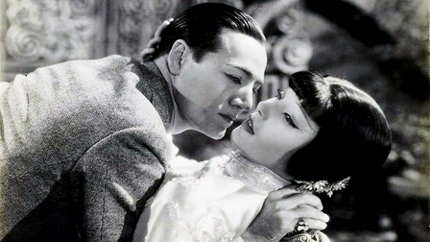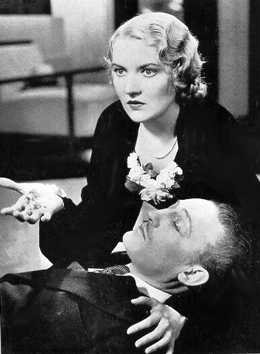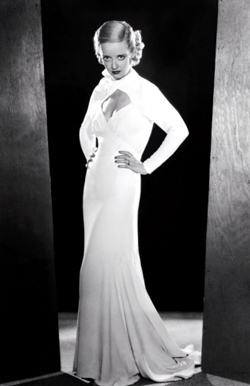
 |
|
|
|
The Warner Archives dishes out another enticing quartet of Pre-Code pictures, from that brief period in classic Hollywood when film subject matter wasn't restricted to what pleased a few Catholic-influenced censors in the Production Code office. These four pictures show no discernable pattern. We get star turns from Edward G. Robinson and Bette Davis, and two pictures about business ethics that seem very similar, before closer examination. The transfers are again quite good, with one title looking better than new. Whereas Volume 6 gave us a group of Warners' proletarian heroines from the period, this collection brings out the fashion plates. Maureen O'Sullivan, soon to become Tarzan's Jane, graces one MGM show. Loretta Young dazzles us twice, and once in elaborate ethnic makeup. And Bette Davis fans will get a chance to evaluate her star appeal in the early year of 1933. The Hatchet Man (1932) is an interesting anomaly, an exotic melodrama that delves just deep enough into Chinese-American culture to pull out some novel thrills. The picture has no Anglo characters but all of the speaking roles go to familiar talent in yellow-face: Dudley Digges, Tully Marshall, Charles Middleton. The great J. Carroll Naish, at this time playing walk-on villains, is especially good in his brief appearance. The Production Code might have given the film a pass on the basis that its adulterers are non-white heathens and therefore not considered "people" per the unwritten rules. But some interestingly macabre violence shows up, that most certainly would have caused flags to drop. 
At first sight the film's star is production designer Anton Grot, who puts together a terrific San Francisco Chinatown pad for Wong Low Get (Edward G. Robinson), an elder Tong member. The Tongs are business associations that become violent gangs when war breaks out; old Dashiell Hammett stories are fond of saying that the S.F. Police just stayed out of the way when trouble broke out in Chinatown. The story is racist at its base, yet creates some strong characters. In the old days Wong was a 'hatchet man' whose job was executing enemies and traitors. He inherited the gorgeous Sun Toya San (Loretta Young with altered eye makeup) as a baby, has raised her, and according to her father's will, can now marry her. Event though it's 1929, not 1915, and Sun Toya is a Thoroughly Modern jazz baby, she consents to the marriage out of affectionate respect. Wong is unhappy when a new Tong war breaks out. His old-school colleagues don't recognize the modern threat when a white outfit moves in on the Tong's turf, so Wong must break out the hatchet again. What he doesn't realize is that Sun Toya has lost her heart (and body) to Harry En Hai (Leslie Fenton), a punk hired as her bodyguard. The last third of the picture plays out a tragic fate, restoring an eerie balance to broken traditions and stolen hearts. It's been proven repeatedly that Edward G. Robinson could conquer most any role. He displays no stage affectations as Wong, and comes off well. The mature screenplay doesn't require Wong to seek vengeance or go crazy over his misfortune, which is a definite plus. Loretta Young is as usual a to-die-for beauty that respects her guardian-turned husband but cannot control her passions. The unsung Leslie Fenton actually looks terrific in his Asian makeup and comes off beautifully as a second-generation Chinese who's chosen American gang manners and hopped up music thrills. Under William A. Wellman's assured direction, the movie's exciting ending is worthy of Edgar Allan Poe. Skyscraper Souls is a key picture for anybody studying Pre-code film attitudes on the Depression. Star Warren William was a big name for about five years, playing all-powerful plutocrats that are either calculating swine, or misunderstood moguls. He's at full power in this tale of a high-flying executive trying to pull off a financial coup, and gain full control of a fantastic 100-story office tower that dwarfs the Empire State Building. 
The interesting story shows the enormous new building packed with normal people lucky to have their little jobs or trying desperately to get out from under crushing money problems. Down-on-his-luck Slim (Wallace Ford) considers robbing a jewelry merchant so he can run away with another man's unhappy wife, Myra (Helen Coburn). Funny working guys (Richard Alexander, Edward Brophy) glom the beautiful women that come into the building. Young Tom (future director Norman Foster) chases pretty visitor Lynn (Maureen O'Sullivan) in a way that today would see him arrested for harassment. Up in the main office things are different. Building director David Dwight (Warren William) swings the slick deals and careful evasions that keep bankers from taking over his monument to hubris. David's private secretary-mistress Sarah (Verree Teasdale) thinks that he'll someday divorce his wife (Hedda Hopper), when in actuality he's planning to ease Sarah out of the picture and replace her with the green newcomer Lynn. His first step is to get Lynn potted at a swank party, the better to compromise her in his luxurious sky-high apartment. Dwight is a brilliant tactician and the kind of man that never questions taking what he wants. His response to a financial squeeze is to pull off a dirty deal that will allow him to push his partners out of the picture altogether. After all, they'd do the same thing to him if they could. But David thinks he can pull the same game on Sarah, which in the violent climax turns out to be a major mistake. William makes a totally convincing heel and Maureen O'Sullivan is again a delectable new girl in town, who somehow gets caught changing clothes in the big boss'es office. The large cast fills out a number of sidebar plots, one of which brings on more death and despair. Fading personality Anita Page has a nice bit as Lynn's friend. Overall, the show preaches optimism and resilience, yet the picture given of big-city values is pretty damning. There's no overt pro-Roosevelt message here, nor any hint that the system needs an overhaul, but I'd think that thought might occur to plenty of worried moviegoers in the summer of '32. At first glance Employees' Entrance seems a Warners redo of Skyscraper Souls. Warren William is another big business honcho fighting for control of a business and threatening the virtue of yet another beauty lost in the big city. But it's actually a radical statement that bears comparison to, of all things, Billy Wilder's celebrated The Apartment. 
The draconian measures of executive Kurt Anderson (Warren William) have expanded the profits from the department store in his care. With the Depression in full swing, he is resisting outside advice to tighten belts by cutting down the staff. He instead demands exceptional performance from his department heads. He ruthlessly eliminates anyone who can't perform, which includes older employees mired in tradition. When the outside supplier Garfinkle (Frank Reicher) can't meet a delivery deadline, Kurt drives him into bankruptcy. The man ends up working as one of Kurt's store clerks. Young Martin West (Wallace Ford) has creative ideas to increase clothing sales, which Kurt encourages. A hit-and-run seducer, Kurt beds job applicant Madeline (Loretta Young) in a one-night-stand date. She comes out of the experience with a job as a store model. A firm believer that women and business do not mix, Kurt makes Martin his new assistant. He demands that he stay single, even though Martin and Madeline are soon secretly married. Later, at a store party, Kurt again takes advantage of Madeline during a moment of weakness. The pressure grows as bankers try to wrest control of the store. Kurt fights them off while forcing his will on his married employees. What will Martin do when he finds out that Kurt has had Madeline, both before and after their wedding? Employees' Entrance is fascinating because its anti-hero Kurt Anderson is presented as a possible cure for the Depression. Rather than throw his employees onto the street, he keeps the store reasonably intact and drives them to over-perform. The owners don't appreciate Kurt's economic miracle but his tortured employees do, if only in a perverse way. Kurt cuts executive and departmental pay and encourages anyone who doesn't like it to quit. He pioneers new ideas, like Martin's notion that men's garments should be featured near the women's section, as the wives do most of the shopping for their husband's clothes. But Kurt isn't moved when a beloved older employee commits suicide after being let go. His business ideology has no room for sentiment. He tells Martin that if a man can't perform, he ought to jump out of a window. The go-getter Martin just wants to live without fear of dismissal over the 'crime' of being married, while Garfinkle looks forward to the day when he can force Kurt to swallow some of his own merciless business medicine. Although the screenplay rightly labels Kurt Anderson an unmitigated SOB, it doesn't condemn him, and grudgingly agrees that his cruel vision of the working world is the correct one. Without the BS philosophy of Ayn Rand or the hateful rhetoric of modern advocates of de-regulation, Employees' Entrance basically proposes that the cure for bad economic times is a kind of Business Fascism. Sentimentalists like Martin and Madeline had better move on. The story's sex angle is similar to but far more ruthless than Billy Wilder's supposedly "cynical" The Apartment. Kurt openly hires 'model' Polly (Alice White) to seduce another executive and considers buying her companionship for a trip to Europe. Madeline gives herself to Kurt because she wants to but also because he's a powerful man who can save her from hardship and hunger. Just another of Kurt's casual conquests, she again becomes his target after an argument with her husband and a few drinks. As far as Kurt is concerned, poaching rights are his droit du seigneur. Kurt gets to crow at dawn but Madeline's disgrace inspires a suicide bid. As Wallace Ford's Martin isn't the total softie-Mensch of The Apartment, we can only hope that things turn out for the best. Billy Wilder and I.A.L. Diamond quoted other inspirations, but the emotional setup for their movie is right here. As it isn't bound by The Code, Employees' Entrance doesn't have to calculate a Church-approved payback for every sin depicted on screen. Remakes were just as common in the 1930s as they are now. The fourth entry Ex-Lady is a re-do of Illicit, made only two years older and distinguished by its debut of Barbara Stanwyck. Here it's been turned into a vehicle for Bette Davis, who at the time was solidifying her position as a leading lady. Davis does her best, slinking about in designer dresses and using her eyes to best advantage in the close-ups. The highlights reflecting from her eye makeup is so noticeable, one would think her upper eyelids had been chrome plated. Director Robert Florey's work is almost invisible, except for a couple of interesting high-angled shots of Bette Davis on the floor, and a few other odd angles. 
The story is an oh-so modern investigation of marriage among average people that live totally independently in swank New York apartments, wear suits and ties to breakfast and spend most nights on the town. Commercial artist Helen Bauer and advertising man Don Peterson (Bette Davis & Gene Raymond) are co-habiting most nights; when Helen's father condemns her behavior, she isn't bothered in the least. Don proposes marriage but Helen values her freedom and is expresses concern that life would become dull. Their friends Hugo and Iris Van Hugh (Frank McHugh & Claire Dodd) are married, and Iris is bored to tears. They get married after all, only to find that work stress and a minimal commitment are a drag. They try separating and meeting for exciting 'dates', just like old times, but outside relationships threaten the relationship. Even silly Hugo thinks that Helen is available. Ex-Lady tries to be sophisticated by making its showcase couple conscious of relationship problems, even as they stumble on simple romantic troubles one would expect to see in Junior High School. Helen makes a big noise about being bored and wanting her freedom, and Don's respectful and courteous attitude vanishes as soon as work realities intervene. The context for these lovers doesn't leave a lot of wiggle room. Helen should be grateful that she's talented and employable, or she'd have little choice but to obey her unforgiving father. Don's agency isn't a patch on Mad Men's Don Draper; his two worthless employees couldn't be depended upon to clean a bird cage. The only other marriage in sight fizzles because the wife can no longer abide the husband's inability to do anything but drink and quote poetry. (Or maybe the lipstick actor Frank McHugh wears has something to do with it.) When Helen and Don are living separately, they're both pursued by others. The married Peggy (Kay Strozzi), who is actually very unattractive, asks Don over for drinks. Helen consents (why?) to go out with the slimy Monroe Owsley (Nick Malvyn), who looks like Pee Wee Herman and whose only interest in Helen is to drag her to bed. So naturally Helen and Don belong together, and the most that Ex-Lady can front as a conflict is a couple of tepid bursts of jealousy. Yes, it's tough to make choices when economics are no problem. Nobody's in need of simple companionship, or is even thinking of having children. 1 Self-interest is the only yardstick. MGM made these pictures work by throwing up an intimidating Wall Of Glamour. After the code came in, even their movies about average people were bathed in a glamorous aura. Warners did much better when it kept its glossy Kay Francis soaps separate from its more successful proletarian dramas, which became the mirror and conscience of changing values in the Depression. 
The Warner Archive Collection DVD-R of Warners Forbidden Hollywood Collection Volume 7 keeps up the quality end of things nicely. Hatchet Man is the only title to really show its age, and only the opticals (dissolves & montages) show more grain on the other films. Duping film stocks were so noticeably grainy back then that I'm surprised that the studios didn't experiment with a direct cutting style to avoid them, as did later European pictures. Each picture comes with an original trailer. They often use alternate takes and angles. The trailer for Employees' Entrance makes reference to the "hot" actress Alice White's return to the screen, and sure enough, online mentions refer to vague scandals interrupting Ms. White's career. The trailer for Ex-Lady employs several choker close-ups of Bette Davis not seen in the film itself; we wonder if director Robert Florey might have been experimenting with more eccentric angles until Davis or producer Zanuck asked him to knock it off. The trailer text also gives us more clues about the social context. A big title in Ex-Lady implies that women need marriage for 'protection'. Is it saying that Bette Davis' character needs protection from sexual predators, or that the 'weaker sex' in general needs to be protected by biggus strongus manly men? If so, the culture certainly has changed its mind on a few things.
On a scale of Excellent, Good, Fair, and Poor, Footnote:
1. I think it is interesting that nobody seems particularly concerned that the sex in these movies might result in the obvious, a pregnancy. As the Production Code surely had a problem with that issue (and the culture at large seemed intent on keeping people ignorant about procreation), these movies just ignore the fact that Helen and Don's selfish lifestyles might be interrupted by a Blessed Event. And in Employees' Entrance that fact that Madeline could easily be impregnated by Kurt Anderson, before or after her marriage, isn't even an issue. Babies aren't part of the "thesis", and in '30s movies they only seem to come to the poor or the well-heeled rich. Nobody has to quit a job over a baby, or permanently move back to Nebraska. The movies inadvertently give the impression that these women are risking only their "honorable virtue", not pregnancy... as if God had to be involved to get pregnant. If plenty of young women today become pregnant out of blind ignorance and inexperience, these earlier "It's a Man's World" times must have been terribly harsh.
Reviews on the Savant main site have additional credits information and are often updated and annotated with reader input and graphics. Also, don't forget the 2011 Savant Wish List. T'was Ever Thus.
Review Staff | About DVD Talk | Newsletter Subscribe | Join DVD Talk Forum |
| ||||||||||||||||||